|
|
|
Sort Order |
|
|
|
Items / Page
|
|
|
|
|
|
|
| Srl | Item |
| 1 |
ID:
132417
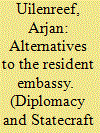

|
|
|
|
|
| Publication |
2014.
|
| Summary/Abstract |
Increasingly integrated in a common political entity, the European Union's member states are exploring new avenues to shape and maintain their mutual relations. This analysis describes three alternatives to the traditional resident embassy by which ministries of foreign affairs within the EU attempt to maintain diplomatic networks. The models discussed are secondments within member states' capitals, visiting ambassadors, and co-location and co-operation. In other words, with regard to different modes of representation, member states can consider diving in, stepping back, or pooling and sharing. These developments shed light on the ways in which the diplomatic machineries of the member states are trying to adapt to the demands of a "post-Westphalian" environment such as that of the EU.
|
|
|
|
|
|
|
|
|
|
|
|
|
|
|
|
| 2 |
ID:
130843
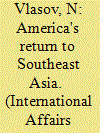

|
|
|
|
|
| Publication |
2014.
|
| Summary/Abstract |
The article examines U.S. foreign relations with Southeast Asia. An increase in U.S. involvement in the region under the administration of President Barack Obama is considered. A contradiction in U.S. policy is said to exist between insistence by the administration that its desire for stability and freedom of the seas in Southeast Asia is not intended as containment of China and China's aggressive maritime boundary claims in the South China Sea.
|
|
|
|
|
|
|
|
|
|
|
|
|
|
|
|
| 3 |
ID:
130964
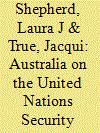

|
|
|
|
|
| Publication |
2014.
|
| Summary/Abstract |
Until 2015, Australia is uniquely positioned on the world stage to make a real difference to women's lives in conflict, transitional and post-conflict countries by ensuring they are actively represented in all peace negotiations1. The Australian government has secured not only a non-permanent seat on the United Nations Security Council (UNSC), but also a seat on the Executive Board of UN Women, the UN entity charged with enhancing gender equality and the empowerment of women. These represent two internationally significant avenues through which the Australian government can fulfil its promise to engage women in the governance of international peace and security, furthering the UN's Women, Peace and Security (WPS) agenda. This agenda, the primary architecture of which comprises seven interrelated UNSC Resolutions dating back to UNSC Resolution 1325 (2000), mandates that women should be represented at and actively participate in all peace negotiations, as well as making binding international commitments to eliminate violence against women and protect women's rights
|
|
|
|
|
|
|
|
|
|
|
|
|
|
|
|
| 4 |
ID:
131444
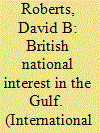

|
|
|
|
|
| Publication |
2014.
|
| Summary/Abstract |
The British government is in the process of re-energizing its relations with the Gulf states. A new Gulf strategy involving a range of activities including more frequent elite bilateral visits and proposals sometimes touted as Britain's military 'return to east of Suez' are two key elements of the overarching strategy. Such polices are designed to fall in line with British national interest as identified by the government-authored 2010 National Security Strategy (NSS), which emphasizes the importance of security, trade, and promoting and expanding British values and influence as perennial British raisons d'etat. In the short term, the Gulf initiatives reflect and compliment these core interests, partly based on Britain's historical role in the region, but mostly thanks to modern day trade interdependencies and mutually beneficial security-based cooperation. However, there is yet to emerge a coherent understanding of Britain's longer-term national interest in the region. Instead, government-led, party-political priorities, at the expense of thorough apolitical analysis of long-term interests, appear to be unduly influential on the origins of both the Gulf proposals and the NSS conclusions themselves. Without a clear strategic, neutral grounding, both the Gulf prioritization and the NSS itself are weakened and their longevity undermined.
|
|
|
|
|
|
|
|
|
|
|
|
|
|
|
|
| 5 |
ID:
131999
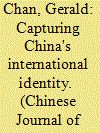

|
|
|
|
|
| Publication |
2014.
|
| Summary/Abstract |
What is China's international identity? How has it changed over time, especially since the reform and opening up of the country in the late 1970s? How does China see itself? And how do other countries see China? I argue that answers to these questions are instrumental to a proper understanding of Chinese foreign-policy behaviour, in ways more significant than we normally assume. To advance this argument, I choose to examine China's social interactions with the outside world to ascertain the evolution of its international identity/identities. I shall trace the domestic sources of China's external policies. In so doing, I hope this article will elucidate the 'debates' between social constructivism and realism as to their relative explanatory power with respect to the making of Chinese international identity. I also hope it will throw light on a possible alternative framework, known as social evolution, for studying China's international relations and its evolving identities.
|
|
|
|
|
|
|
|
|
|
|
|
|
|
|
|
| 6 |
ID:
138603
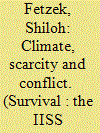

|
|
|
|
|
| Summary/Abstract |
Soon after he took office in 2007, United Nations Secretary-General Ban Ki-moon declared that there was an urgent need to reframe the debate on climate change from an environmental to a development and security issue, and that it would be one of his top priorities as UN leader.
Environmental factors, including land use, water availability, biodiversity loss, soil degradation and acute weather events, have been implicated in at least 73 conflicts since 1980, and at least 40% of intra-state conflicts since the end of the Second World War can be associated with natural resources. A rapidly growing body of research on climate change, resource scarcity and conflict has ensured that the issue is rising on the international agenda. Yet, although such concerns cut across the security, development and humanitarian sectors, there is little dialogue, let alone coordination, between and among government departments and international and non-governmental organisations responsible for these domains.
|
|
|
|
|
|
|
|
|
|
|
|
|
|
|
|
| 7 |
ID:
128088
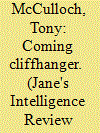

|
|
|
|
|
| Publication |
2012.
|
| Summary/Abstract |
As democratic president Barack Obama begins his second term in the White House, his administration will need to evaluate its many foreign policy agendas.
|
|
|
|
|
|
|
|
|
|
|
|
|
|
|
|
| 8 |
ID:
132307
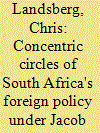

|
|
|
|
|
| Publication |
2014.
|
| Summary/Abstract |
South Africa's foreign policy could be viewed as a set of concentric circles which define the Republic's international priorities. In an attempt to bring coherence and predictability to them, the Zuma government has tried to learn from its predecessor, the Mbeki government (1999-2008), by putting emphasis on key international relations and concerns, and the idea was suggested that these different layers reinforced each other.
According to stated policy, pursuit of the national interests lay at the heart of the Republic's international strategies and came to be regarded as the new glue that holds it together, albeit it is four years into Zuma's government and the 'national interest' remains poorly developed and in need of expansion and implementation. A set of wider foreign policy concentric circles informs foreign policy, championed as 'Pursuing African Advancement and Enhanced Cooperation'. This agenda was to be pursued under a series of sub-goals or sub-categories, for our purposes concentric circles, namely (a) closing the gap between domestic and foreign policy; (b) continued prioritisation of the African continent-the Mbeki government called it African Agenda, or Africa first policy; (c) strengthening South-South relations; (d) strategic relations with strategic formations for the North; (e) participating in the global system of governance and (f) strengthening political and economic relations. While these six pillars were clearly developed on paper, and self-standing, how they all relate to the epicentre of the national interest and overlap one another is not so clear. More serious effort is needed on the part of government to close this lacuna, and the idea of coherence between them should not be assumed if there is to be consistency between them and the stated annulus of national interest.
|
|
|
|
|
|
|
|
|
|
|
|
|
|
|
|
| 9 |
ID:
131992
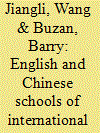

|
|
|
|
|
| Publication |
2014.
|
| Summary/Abstract |
This article compares the academic histories of the so-called 'Chinese School' and the English School in the six dimensions of origin, founders, and organization; naming; context; aims/intentions; theory sources; and historical projects. The English School is mature enough to present fairly clear contents for each section, but as the Chinese School is much newer and still hotly contested as a concept, many things about it are uncertain and controversial; it lacks a single defining concept or frame. The opportunity at hand, therefore, is to apply the experience of the English School to the formative process of a Chinese School or schools, at the same time making clear the considerable differences that time, place and circumstance make to the two projects. The article concludes by looking at possible lessons for the development of International Relations (IR) theory in China, both from what the English School has accomplished and for which it has been criticized. Along the way we provide a bibliographical introduction to both projects.
|
|
|
|
|
|
|
|
|
|
|
|
|
|
|
|
| 10 |
ID:
132397
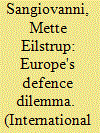

|
|
|
|
|
| Publication |
2014.
|
| Summary/Abstract |
Fifteen years ago, the European Union (EU) launched a Common European Security and Defence Policy (CSDP). Since then, the CSDP has been the focus of a growing body of political and scholarly evaluations. While most commentators have acknowledged shortfalls in European military capabilities, many remain cautiously optimistic about the CSDP's future. This article uses economic alliance theory to explain why EU member states have failed, so far, to create a potent common defence policy and to evaluate the policy's future prospects. It demonstrates, through theoretical, case study-based and statistical analysis, that CSDP is more prone to collective action problems than relevant institutional alternatives, and concludes that the best option for Europeans is to refocus attention fully on cooperation within a NATO framework.
|
|
|
|
|
|
|
|
|
|
|
|
|
|
|
|
| 11 |
ID:
131511
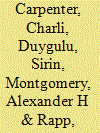

|
|
|
|
|
| Publication |
2014.
|
| Summary/Abstract |
Through a series of focus groups with human security practitioners, we examined how powerful organizations at the center of advocacy networks select issues for attention. Participants emphasized five sets of factors: entrepreneur attributes, adopter attributes, the broader political context, issue attributes, and intranetwork relations. However, the last two were much more consistently invoked by practitioners in their evaluations of specific candidate issues. Scholars of global agenda setting should pay particular attention to how intranetwork relations structure gatekeeper preferences within transnational advocacy spaces because these help constitute perceptions of issues' and actors' attributes in networks.
|
|
|
|
|
|
|
|
|
|
|
|
|
|
|
|
| 12 |
ID:
132015
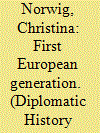

|
|
|
|
|
| Publication |
2014.
|
| Summary/Abstract |
This article explores the central role of youth in the process of European integration. Analyzing the sources of the European Youth Campaign, an international program implemented by the European Movement in the fifties, it focuses on the symbol of youth in discourse on European integration, as well as on the historical agency of young people. After World War II, Europeans conceptualized a future united Europe in terms of "youthfulness" to distinguish the new era from the continent's violent past. Young people also referred to the traditional "myth of youth" in their statements and actions. By staging themselves as a "first European generation," they staked claims to agency in the process of building a new united Europe. Various examples of youth projects reveal the actual role of young people as historical agents and show how the politics of European integration and the Cold War played out at a grass-roots level. With their participation, young people not only helped to constitute the prevailing power constellations; they also challenged them.
|
|
|
|
|
|
|
|
|
|
|
|
|
|
|
|
| 13 |
ID:
130351
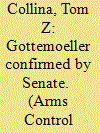

|
|
|
|
|
| Publication |
2014.
|
| Summary/Abstract |
In the face of accusations that the administration had withheld information from Congress on possible Russian Violations of an arms treaty, the Senate on March 6 voted to confirm President Barack Obama's choice to be his top arms control official. Rose Gottemoeller, first nominated in September 2012 to replace Ellen Tauscher as undersecretary of state for arms control and international security, had been serving as acting undersecretary and as assistant secretary for arms control, verification, and compliance. She was the main U.S. negotiator of the New Strategic Arms Reduction Treaty (New START), which the Senate approved in December 2010. The Senate approved Gottemoeller's nomination by a nearly party-line vote, 58-42, with the support of 50 Democrats, six Republicans, and two independents. Three Democrats and 39 Republicans were opposed. The Republicans voting for Gottemoeller were Lamar Alexander (Tenn.), Susan Collins (Maine), Bob Corker (Tenn.), Jeff Flake (Ariz.), Johnny Isakson (Ga.), and Lisa Murkowski (Alaska). The Democrats opposing her were Heidi Heitkamp (N.D.), Jon Tester (Mont.), and John Walsh (Mont.). After being approved twice by the Senate Foreign Relations Committee, once last October and again in February, Gottemoeller's nomination was held up by Sen. Marco Rubio (R-Fla.) and others over concerns that the administration had dragged its feet in informing them about Russia's possible violation of the 1987 Intermediate-Range Nuclear Forces (INF) Treaty. (See ACT, March 2014.) In a Feb. 28 statement, Rubio and Sens. John Cornyn (R-Texas) and James Risch (R-Idaho) accused Gottemoeller of "failing to quickly pursue evidence of Russia's [non]compliance with multiple arms control agreements and her delay in making the Senate aware of these violations." The three senators also said they were "frustrated" that the administration did not make a written commitment that "any future U.S. nuclear reductions would be carried out only through a treaty subject to the advice and consent of the Senate" and not by unilateral or other means that did not involve a treaty, such as reciprocal reductions carried out by the United States and Russia in 1991. At Gottemoeller's confirmation hearing Sept. 26, Rubio pressed her on the issue of unilateral cuts. Gottemoeller replied that the administration had already begun to pursue an arms control treaty with Russia, a process she described as "a difficult slog." She said that "unilateral reductions are not on the table," but did not rule them out in the future. (See ACT, November 2013.)
|
|
|
|
|
|
|
|
|
|
|
|
|
|
|
|
| 14 |
ID:
133649
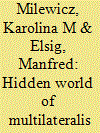

|
|
|
|
|
| Publication |
2014.
|
| Summary/Abstract |
Why do new EU democracies engage in multilateralism? The dominant explanation proposes that new democracies use international treaties to lock in domestic reforms. This article offers a novel explanation as to why new EU democracies participate in multilateral treaties. We argue that ratifying a treaty serves three external signaling purposes (recognition concerns, increasing strategic autonomy, and pleasing the European Union). We test our argument through a mix of quantitative and qualitative methods. First, we apply event history analysis. Drawing on a new ratification data set comprising 76 multilateral treaties, we illustrate the prominent role of new EU democracies in multilateralism as compared to other new democracies. Second, to assess the importance of external signaling in the decision to ratify multilateral treaties, we examine parliamentary ratification debates in selected Central and Eastern European countries. Third, we compare parliamentary discussions across European and non-European new democracies to demonstrate the different motives driving their approaches toward multilateralism.
|
|
|
|
|
|
|
|
|
|
|
|
|
|
|
|
| 15 |
ID:
132026
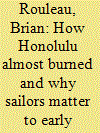

|
|
|
|
|
| Publication |
2014.
|
| Summary/Abstract |
This article argues that in ignoring the exploits of American sailors overseas, diplomatic historians have missed a very important facet of the early republic's foreign relations. It claims that 1898 did not represent any decisive turn to the international, but rather, a moment in which primary control over the nation's foreign relations shifted from maritime nonstate actors to the state itself. To make this case, the essay discusses the form and substance of violent altercations between American seafarers and those they encountered abroad. It reads barroom brawling and harborside tumult as "diplomatic fisticuffs," that is, as sites for the enactment of a distinct, working-class and masculine foreign relations agenda. Politicians, diplomats, and missionaries, however, saw the mighty influence seafaring men exerted overseas as deeply problematic. But even as the American state worked to control rambunctious sailors, late nineteenth-century policy makers discovered that appropriating the violent words and deeds of the nation's nautical class could prove useful in justifying imperial adventure abroad. Thus even as the nation's mariners receded from view overseas, they continued to influence events around the globe.
|
|
|
|
|
|
|
|
|
|
|
|
|
|
|
|
| 16 |
ID:
133854
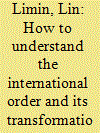

|
|
|
|
|
| Publication |
2014.
|
| Summary/Abstract |
What is the international order? Professor Zhoa Xiaochun define it as the standards and specifications established by the members of the international system in order to maintain its stability and normal operation as well coordinating and addressing international affairs, and acting as a guarantee mechanism, a decision making process and providing rules of agenda.
|
|
|
|
|
|
|
|
|
|
|
|
|
|
|
|
| 17 |
ID:
130967
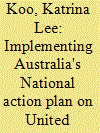

|
|
|
|
|
| Publication |
2014.
|
| Summary/Abstract |
Australia's victory in securing temporary seats on the United Nations Security Council and the United Nations Executive Board has been much celebrated. This provides an important platform for Australia to further the agenda of women's rights worldwide. As part of this agenda, Australia has provided a commitment to implement United Nations Security Council Resolution 1325 on Women, Peace and Security through the development of the National Action Plan on Women, Peace and Security 2012-2018, released in 2012. This article examines the early thoughts and efforts towards the implementation of this plan. It demonstrates that while there is a broad rhetorical commitment to implementation by Australian actors, there are nonetheless challenges that may threaten its success. Based in part upon interviews with Australian government representatives and policy makers, and activists and advocates of the Women, Peace and Security agenda, this article highlights the success, challenges and opportunities that have so far been associated with implementing this important Resolution.
|
|
|
|
|
|
|
|
|
|
|
|
|
|
|
|
| 18 |
ID:
133842
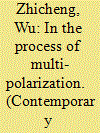

|
|
|
|
|
| Publication |
2014.
|
| Summary/Abstract |
The international system is the relatively stable framework of international relations constituted by various international actors, and represented by the great powers. The various international actors interact with one another in the framework. Therefore, against the current background of deepended globalization.
|
|
|
|
|
|
|
|
|
|
|
|
|
|
|
|
| 19 |
ID:
132016
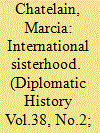

|
|
|
|
|
| Publication |
2014.
|
| Summary/Abstract |
After World War II, the Girl Scouts of the United States of America identified international friendship as a key component of its program. In 1957, the Girl Scouts partnered with their international counterparts, the World Association of Girl Guides, to establish Our Cabaña, an international meetinghouse in Cuernavaca, Mexico, where Girl Scouts could meet and befriend fellow members from around the globe. Soon after opening Our Cabaña, leaders noticed that some Girl Scouts repeatedly ignored rules about proper behavior in Mexico, and they feared that Scouts would alienate their Guide sisters and poorly represent the United States. This article asserts that responses to the problems at Our Cabaña demonstrate a critical shift in Girl Scouts' stance on what constituted a good girl ambassador; the organization evolved from promoting manners in intercultural settings to declaring that cultural sensitivity was necessary for girls to become global citizens.
|
|
|
|
|
|
|
|
|
|
|
|
|
|
|
|
| 20 |
ID:
132019
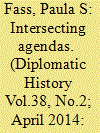

|
|
|
|
|
| Publication |
2014.
|
| Summary/Abstract |
These five articles allow us to think about the history of childhood and the history of international affairs as intersecting forms of inquiry in ways not usually proposed, and their diversity of focus and approach make the encounter eye-opening. In collecting papers set in North America, the Soviet Union, a nascent united Europe, as well as Asia and Africa, the organizers of the initial conference have brilliantly suggested just how widespread and potentially powerful this intersection might be and how fertile a field they are opening up for future development.
|
|
|
|
|
|
|
|
|
|
|
|
|
|
|
|
|
|
|
|
|